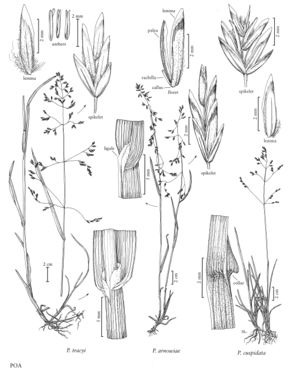Poa tracyi
Plants perennial; loosely tufted, shortly rhizomatous. Basal branching mainly extravaginal. Culms (25)32-125 cm, erect or the bases decumbent, not branching above the base, terete or weakly compressed; nodes terete or slightly compressed, 1-2(3) exserted. Sheaths closed for (2/5)1/2 – 9/10 their length, compressed, distinctly keeled, keels winged, wing to 0.5 mm wide, smooth or sparsely to infrequently densely scabrous, glabrous or infrequently retrorsely pubescent, bases of basal sheaths glabrous, distal sheath lengths 0.7-1.6 times blade lengths; collars with vestiture similar to the sheaths; ligules 2-4.5 mm, smooth or scabrous, glabrous or softly puberulent, obtuse to acute; innovation blades similar to the cauline blades; cauline blades (1.5)2-5.5 mm wide, flat, lax, smooth or sparsely scabrous mainly over the veins, apices broadly prow-shaped, flag leaf blades 6-20 cm. Panicles (8)13-29 cm, erect, usually narrowly pyramidal, open, sparse, with 30-100 spikelets, proximal internodes usually 4+ cm, with (1)2-4(5) branches per node; branches 2.5-18 cm, spreading to eventually reflexed, fairly flexuous, terete to weakly angled, sparsely to moderately scabrous, with 3-34 spikelets. Spikelets 3-8 mm, lengths 3.5 times widths, laterally compressed, not sexually dimorphic; florets 2-8; rachilla internodes 1+ mm, smooth, glabrous. Glumes narrowly lanceolate, distinctly keeled; lower glumes 1.6-3.5 mm, 1(3)-veined, 1/2-1/3 as long as the adjacent lemmas; upper glumes 2.2-4.9 mm; calluses webbed, hairs over 1/2 the lemma length; lemmas 2.6-5 mm, lanceolate, distinctly keeled, keels and marginal veins long-villous, extending 1/2 - 2/3 the keel length, 1/3-1/2 the marginal vein length, lateral veins sometimes short-villous, the lateral veins obscure to moderately prominent, intercostal regions usually sparsely softly puberulent, margins glabrous, apices acute; palea keels scabrous, rarely softly puberulent at midlength; anthers vestigial (0.1-0.2 mm) or (1.3)2-3 mm. 2n = 28, 28+1.
Discussion
Poa tracyi grows primarily in coniferous forest openings, sometimes with gambel oak, and in subalpine mesic meadows. It is restricted to the front ranges of the southern Rocky Mountains; it is not common. It differs from P. occidentalis (p. 536) in having longer and/or rudimentary anthers, shorter ligules relative to the leaf blade width, and a loose, shortly rhizomatous habit. Retrorsely pubescent sheaths are common in the more southern plants. It is sequentially gynomonoecious.
Selected References
None.
